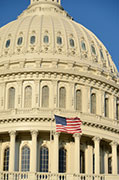- The Best Time of Day to Drink Bone Broth to Maximize Health Benefits
- 8 Ways to Increase Dopamine Naturally
- 7 Best Breads for Maintaining Stable Blood Sugar
- Gelatin vs. Collagen: Which is Best for Skin, Nails, and Joints?
- The Long-Term Effects of Daily Turmeric Supplements on Liver Health
- Could Your Grocery Store Meat Be Causing Recurring UTIs?
- Are You Making This Expensive Thermostat Error This Winter?
- Recognizing the Signs of Hypothyroidism
- 10 Strategies to Overcome Insomnia
- Could Artificial Sweeteners Be Aging the Brain Faster?
In Elections, Thin May Help Bring the Win


For politicians, slimmer waistlines may mean more votes on Election Day, a new study finds.
“We found weight had a significant effect on voting behavior,” study co-author Mark Roehling, a professor of human resources at Michigan State University in East Lansing, said in a university news release. “Additionally, the greater size disparity between candidates, the greater the vote share of the more slender candidate.”
In their study, Roehling — along with wife Patricia Roehling, a psychology professor at Hope College in Holland, Mich. — tracked data from the 2008 and 2012 U.S. Senate elections.
They looked specifically at whether the candidates in 126 primary and general elections were normal-weight, overweight or obese.
The research showed that obese men and women were less likely to even make it through the primaries than normal-weight candidates. In the actual Senate elections, overweight and obese male and female candidates received a lower share of the vote total than thinner opponents, the study found.
The research “provides evidence that the bias and discrimination against the overweight and obese that has been documented in the areas of employment, education, health care and social situations also extends to the electoral process in the United States,” Roehling said.
The study also found that overweight women were underrepresented on the ballot, but not overweight men.
This is consistent with previous studies showing that slightly overweight women experience more discrimination than slightly overweight men, the researchers said.
While the study couldn’t prove cause and effect, the Roehlings say the findings aren’t all that surprising, since other studies have found weight discrimination present in schools, business and entertainment.
The study was published online in May in the journal Equality, Diversity and Inclusion.
More information
The U.S. National Institute of Diabetes and Digestive and Kidney Diseases outlines the health risks of being overweight.
Source: HealthDay
Copyright © 2026 HealthDay. All rights reserved.










